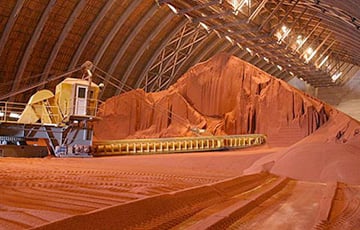New Problems Of Belaruskali
4- 23.03.2024, 15:32
- 8,104

They don’t seem to end this year.
Potassium prices have been declining throughout last year. And it won't get any better this year either. Apparently, it will get worse. At least this is what recent Chinese statistics hint at.
About this in the new episode of the “Optimum” show on the “Belarusians and the Market” YouTube channel.
In the first two months of this year, China increased its purchase of potash fertilizers by a quarter. This is if you count in tons. But if we count in money, then the price of purchasing these fertilizers, on the contrary, has become one third less. Purchase volumes have increased, and the costs of purchasing them, on the contrary, have decreased. In total, in January-February, China bought 2.64 million tons of potassium worth $832 million.
In fact, it is not surprising that China is buying more and spending less. Now China buys potash at $316 per ton. A year ago the price was $590 per ton.
But even this new price, which is almost two times lower than last year, is still higher than the average price on the world market. And this is bad news for Belaruskali. Because this means that, most likely, prices will continue to decline.
Because the potash market is structured in a very specific way. China and India are the two largest buyers of potash. These countries enter into long-term contracts for the supply of fertilizers at a fixed price. And then this price becomes a reference point for all other buyers.
At the same time, since China is the largest buyer of potash fertilizers in the world, since it negotiates the purchase of very large quantities at once, there is a decent discount for it. The price for China is usually lower than for all other buyers.
If from the middle of last year China bought fertilizers at $307 per ton, then the average world price fluctuated around 350. However, from the end of the year the situation began to change. Fertilizer prices have gone down. One of the reasons, by the way, is aggressive dumping on the part of Belarus.
By March, the average cost of a ton of potassium decreased by $40 compared to November. And if China buys fertilizers for 316 dollars, then the world price in February was 290.
This means that China will now seek price reductions under long-term contracts. And, most likely, it will achieve it. Because there is no shortage of fertilizers on the market, and demand is growing slower than supply. And if the price for China falls, then the price for others will also fall.
Moreover, Belarus most likely will not be able to play on its proprietary principle of “volumes above prices.” It will not be able to compensate for the price reduction by increasing sales. Because Belarus has already used all the advantages of the “volume over price” principle last year.
At least, it was not possible to take advantage of the growth in demand in China at the beginning of this year. In two months, Belarus supplied China with about 450 thousand tons of potassium worth $142 million. In tons, the volume of supplies is approximately the same as last year. So Belaruskali moved from first place in terms of fertilizer supplies to China, which it held throughout last year, to third. And the first two places were taken by Russia and Canada.
Because there are few reserves left to increase production, and logistics do not allow for major acceleration. Russian railways are not endless, and we have no other routes to transport fertilizers to China. And by the end of this year there will be no more logistics opportunities. There is nowhere for them to appear.









